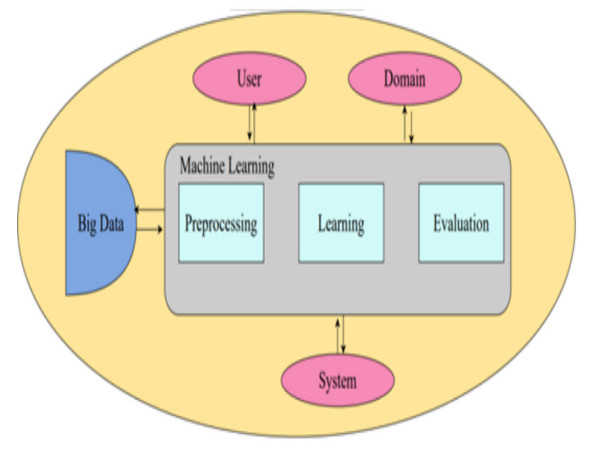GA, UNITED STATES, March 4, 2025 /EINPresswire.com/ -- The surge in digital data presents both unprecedented opportunities and formidable challenges across industries. A recent scoping survey sheds light on the transformative role of machine learning (ML) in unlocking the potential of big data (BD) to reveal hidden patterns, streamline operations, and drive innovation. The study explores the historical evolution of BD and ML, their seamless integration, and the significant obstacles posed by the volume, velocity, variety, and veracity of data. Through real-world case studies in healthcare, finance, e-commerce, and energy, the research underscores how ML can revolutionize decision-making and operational efficiency, paving the way for the next wave of data-driven advancements.
In today’s digital landscape, an explosion of data from diverse sources like social media, sensors, and transactional systems has created a complex challenge for traditional analysis methods. The scale and diversity of these datasets make it difficult to extract actionable insights. machine learning (ML), a vital subset of artificial intelligence, has emerged as the key to automating data analysis, uncovering patterns, and making predictions. Yet, challenges around data scalability, real-time processing, and data quality remain significant barriers. This creates a critical need to explore how machine learning can unlock the full potential of big data (BD), enabling industries to harness the power of this vast information resource.
A team of researchers from the Kalinga Institute of Industrial Technology (KIIT) and Chandragupt Institute of Management has recently published (DOI: 10.1016/j.dsm.2025.02.004) a comprehensive survey in Data Science and Management (February 2025). The paper delves deeply into the convergence of machine learning and BD, mapping out their evolution, present-day applications, and future prospects. By examining both the challenges and opportunities of leveraging ML in the BD era, the research offers crucial insights for industries striving to integrate data-driven decision-making into their operations.
The study identifies four defining challenges of BD—volume, velocity, variety, and veracity—and explores how machine learning is designed to tackle each. For example, ML’s distributed computing frameworks, such as Apache Hadoop and Spark, excel at processing large volumes of data. In terms of velocity, ML enables real-time data processing, which is essential for high-stakes applications like fraud detection and algorithmic trading. To address the variety of structured and unstructured data, the survey highlights the role of advanced techniques like natural language processing (NLP) and deep learning (DL). Additionally, veracity, or ensuring the quality and accuracy of data, is tackled through comprehensive preprocessing and data cleaning methods, guaranteeing reliable insights.
Real-world applications of ML across industries further demonstrate its vast potential. In healthcare, ML is already being used to predict diseases and create personalized treatment plans. In finance, ML powers critical applications such as fraud detection and dynamic credit scoring. The e-commerce sector benefits from ML through personalized recommendations and optimized supply chain management, while the energy industry leverages ML for predictive maintenance and renewable energy forecasting. The research emphasizes the need for scalable storage solutions, advanced computational architectures, and real-time processing capabilities to address the challenges posed by BD.
“The integration of machine learning and BD is not just a technological leap—it’s a paradigm shift in how we understand and utilize information,” says Dr. Rajat Kumar Behera, lead author of the study. “By overcoming the challenges of volume, velocity, variety, and veracity, ML enables industries to make data-driven decisions with unmatched accuracy and speed.”
The implications of this research are far-reaching, particularly for industries where data-driven decision-making is critical. In healthcare, ML holds the potential to enhance patient outcomes through predictive analytics and personalized medicine. Financial institutions can rely on ML for real-time fraud detection and more accurate risk assessments, while e-commerce platforms can enhance the customer experience through smarter supply chains and tailored recommendations. The energy sector, too, stands to gain with ML-powered predictive maintenance and energy consumption models. As machine learning continues to evolve, its integration with BD will not only drive innovation but also improve operational efficiencies, creating new avenues for growth across industries. This study serves as a crucial roadmap for organizations looking to unlock the full power of machine learning in the BD era.
DOI
10.1016/j.dsm.2025.02.004
Original Source URL
https://doi.org/10.1016/j.dsm.2025.02.004
Lucy Wang
BioDesign Research
email us here
Legal Disclaimer:
EIN Presswire provides this news content "as is" without warranty of any kind. We do not accept any responsibility or liability for the accuracy, content, images, videos, licenses, completeness, legality, or reliability of the information contained in this article. If you have any complaints or copyright issues related to this article, kindly contact the author above.
![]()


